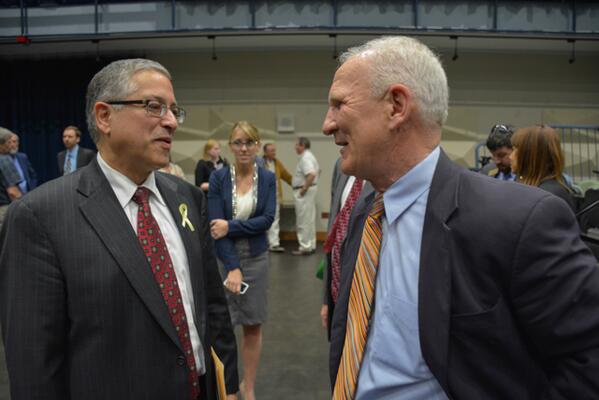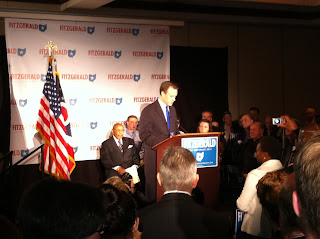That puts county executive candidate Jack Schron -- a Republican county councilman – in a political bind. He wants a different demolition strategy. How will he vote?
“This might be our one shot at spending $50 million,” Schron said at a council meeting yesterday. “If we spend it before we’ve ever put the comprehensive plan together, we’ll put the cart way before the horse.”
The demolition plan is heading for a vote Oct. 28. Will Schron vote no, a week before the county executive election, and create a contrast between himself and his opponent?
The idea of borrowing $50 million to battle blight has been in the works a long time. Former county treasurer Jim Rokakis and various political candidates suggested it, and executive Ed FitzGerald adopted the idea in his February State of the County address. But it had languished in council for months.
Yesterday, the legislation picked up speed. As the council hashed out details, political tensions flared.
Dave Greenspan, the frugal conservative, argued for loaning money for demolition instead of making grants. Yvonne Conwell, who represents much of Cleveland’s East Side, argued that some of the money should go to renovations. The mayors of Shaker Heights, Lakewood and Parma addressed the council, arguing some of the money should be guaranteed for inner-ring suburbs.
Greenspan and curmudgeonly council president Ellen Connally, both critics of FitzGerald, complained about him again.
“This matter was talked about, and suddenly the executive announced it was going to happen,” Connally said, “and we didn’t have any legislation. So we really had to do the down and dirty work.”
“I thought it’d be a whole lot easier to give away $50 million,” Jones said with a smile.
That left an opening for Schron, the manufacturing CEO who seeks efficiency in government.
“It probably is easy to give away taxpayers money,” Schron replied. But even $50 million isn’t nearly enough to tear down all of the estimated 15,000 abandoned buildings in Cuyahoga County.
So Schron, who built his company’s headquarters on a Cleveland brownfield, argued that the demolition program should work more like the state’s brownfields program. He said it should favor sites where a business wants to develop and banks want to invest, near economic development engines such as the Cleveland Clinic.
“The comprehensive plan should come before the money starts to get spent,” Schron argued.
Dan Brady, rumored to be a top contender for council president next year, challenged Schron.
“Plans can get more and more and more comprehensive and never happen,” Brady said. “I’ve seen it over and over and over in government.”
Soon after, Connally called for the legislation to move forward. Council members can propose amendments over the next two weeks, she said.
“Is it the intent that we would be voting on this final legislation in two weeks?” Schron asked.
“It is our anticipation that we vote on the final legislation in two weeks,” Connally replied coolly.
“Will there be no other opportunity for public participation?” Schron asked.
“The public has had every opportunity to come to our meetings, to submit information,” Connally said.
Schron looked peeved. He shook his head, ever so slightly, and said he’d offer an amendment.
After the meeting, I asked Schron if he was frustrated. He said he wanted more time to get the council to consider his ideas. He smiled and said he might hold a press conference about the issue.
I asked if he’d vote for the demolition fund if his amendment is defeated. “I’ll have to wait and see,” he said.
Across the room, Brady was talking with a focused confidence, as if he’d taken the temperature of the room and found it to his liking.
I asked if he had the votes to pass the legislation as it is now.
“Yes,” he said.
What about the amendments still to come?
“If the legislation gets to a place where it’s not going to work, I’ll no longer support it,” Brady said.
Would Schron’s amendment keep it from working? “Yes, and it would take us another six months,” Brady claimed. Blight in Cleveland will get worse if the city can’t tear down abandoned homes, he argued. “It’s an emergency situation.”
Schron can’t be happy that the council’s Democratic majority is forcing him to vote on the demolition plan seven days before Election Day. But if he has to take a stand, he seems ready to use it as an example of how he thinks differently.
He’s trying to make the demolition program business-friendly, to open up land with blighted buildings on it for development. It could be a good way to grow the tax base. But, it could also mean less demolition in city neighborhoods where the real-estate market has hit bottom.
Armond Budish, Schron’s opponent in the executive race, says he “strongly supports” spending the $50 million. So if Schron’s amendment gets shot down, he’ll face a tough vote Oct. 28. Does he vote no and position himself as the more cautious spender, even though Budish may use that vote against him in the city? Or does he vote yes, for a proposal he thinks could be better, to assure voters he’ll take on the blight issue if elected?






